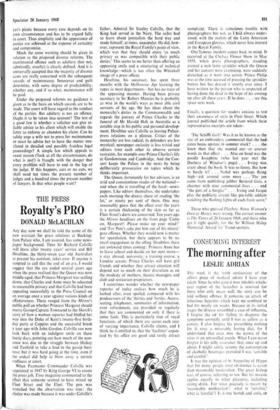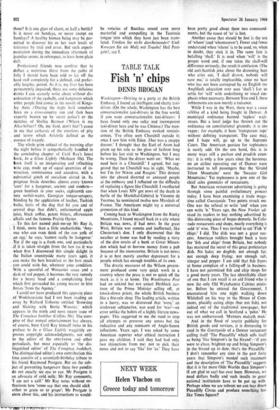The morning after
CONSUMING INTEREST LESLIE ADRIAN
This week is the tenth anniversary of the silliest piece of medical advice I have ever taken. Since he who gave it now inhabits which- ever region of the hereafter is reserved for those who only mean well, the story can be told without offence. It concerns an attack of infectious hepatitis which kept me confined to bed for nearly six weeks. Because in its initial stages the disease resembled a case of influenza, I forgive the GP for failing to diagnose the symptoms correctly until I was as yellow as a canary. I also forgive his prescribing nothing for it save a miserably boring diet, for I understand that even now the nature of the virus is an unravelled puzzle. What I can never forgive is his jolly assurance that, once up and about, I might safely resume the consumption of alcoholic beverages provided I was 'sensible and careful.'
It was the opinion of St Augustine of Hippo that for many people total abstinence is easier than reasonable moderation. The great bishop was, of course, referring to sex. But his maxim applies equally to other pleasures, including strong drink. For what precisely is meant by 'reasonable moderation': what is 'sensible,' what is 'careful'? Is it one Scotch and soda, or
three? Is it one glass of claret, or half a bottle? Is it never on Sundays, or never except on Sundays? A healthy human being may be per- mitted to discover his or her own levels of tolerance by trial and error. But such experi- mentation during the immediate aftermath of jaundice seems, in retrospect, to have been plain daft.
Professional friends now confirm that to deflect a notorious thirst from the paths of folly I should have been told to lay off the hard staff completely for a defined, and prefer- ably lengthy, period. As it is, my liver has been permanently impaired, there are some delicious drinks I can scarcely write about without dis- coloration of the eyeballs, and hangovers which other people find comic in the novels of Kings- ley Amis (During the night he'd somehow been on a cross-country run and then been expertly beaten up by secret police') or the sketches of Shelley Berman ('Where is my Alka-Seltzer? Oh, my God, don't fizz!') cause in me that catharsis of the emotions of pity and terror which Aristotle defined as the essence of tragedy.
The whole grim subject of the morning after the night before is sympathetically handled in the concluding chapter of Cyril Ray's latest book, In a Glass Lightly (Methuen 30s). The book itself is an invigorating and refreshing wine cup, made up of equal quantities of in- struction, reminiscence and anecdote, with a substantial pinch of socialism stirred in. Its poignant finale describes almost every ' known 'cure' for a hangover, ancient and modern— green hemlock in your socks, eighteenth cen- tury surfeit-water, Georgian tongue-scrapers, bleeding by the application of leeches, Turkish baths, hairs of the dog that bit you and of several dogs that didn't, unfermented apple juice, black coffee, patent bitters, effervescent .., alkalis and the famous Prairie Oyster.
To this•-last named pick-me-up Mr ,Ray is, 1, I think, more than a little uncharitable,. 'Any- one who can even think of the raw yolk of an, egg,' he says,. 'cannot really he hungover.' : Net if the egg is a.fresh one, and particularly .f it is taken straight from the hen as it was • when first I discovered this simple delight in the Italian countryside many years ago), it , can make the best breakfast or the best snack , you could wish for, whatever your condition. With a spoonful., of Worcester sauce and a dash of red pepper, it becomes the very remedy for a heavy head and a complaining liver which first persuaded his young master to hire heves 'from the Agency.'
I could not have produced this apposite piece . , of Wodehousiana had I not been reading an essay by Richard Usborne entitled 'Browsing . and Sluicing with Bertie Wooster,' which appears in the ninth and most recent issue of The Cornpleat Imbiber (Collins 30s). The com- pere of that annual entertainment has always, of course, been Cyril Ray himself (who in his preface to In a Glass Lightly waggishly ex- presses. copyright acknowledgments, not only to the editor of the SPECTATOR and other periodicals, but most especially to 'the dis- tinguished editor' of The Compleat Imbiber). The distinguished editor's own contribution this time consists of a seventieth-birthday tribute to his friend Raymond Postgate. But on the sub- ject of preventing hangovers these two pundits do not exactly see eye to eye. Mr Postgate is an advocate of cold milk; Mr Ray comments, 'I am not a calf.' Mr Ray notes without en- thusiasm how 'some say that one should stick either to grain or to grape'; Mr Postgate, is stern about this, and his instructions to would-
be votaries of Bacchus sound even more masterful and compelling in the Teutonic tongue' nto which they have just been trans- lated. Trinken Sic nicht durcheinander! (Ind: Kreuzen Sic nie Malz mit Traube! Heil Post- gate!, say I.



































 Previous page
Previous page